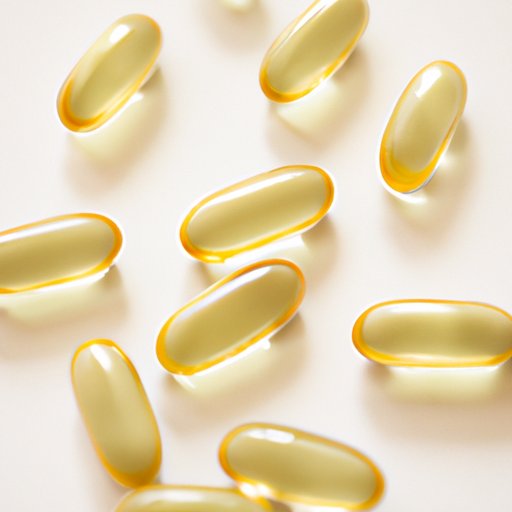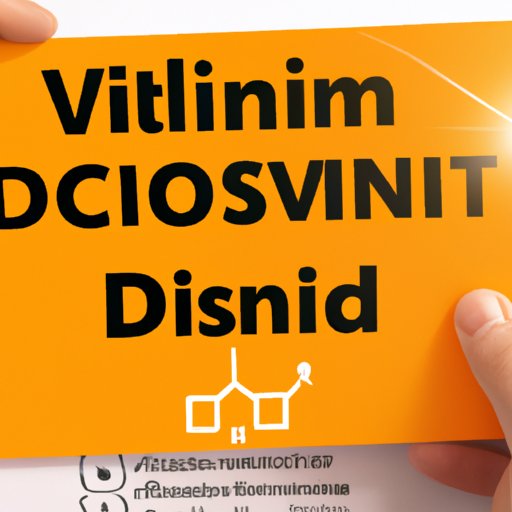
Exploring the Importance of Vitamin D in Our Diet: Foods You Need to Know
If you’re like most people, you may not give much thought to the vitamins and minerals you’re getting from your diet on a daily basis. However, some of these nutrients, like vitamin D, are essential for maintaining good health and preventing disease. In this article, we will explore what vitamin D is and why it’s so important. Whether you’re looking to learn more about the science behind this vital nutrient or are concerned about your vitamin D intake, you’ll find everything you need to know here.
The Role of Vitamin D in the Body
Vitamin D is a fat-soluble vitamin that is essential for a variety of functions in the body. One of the most important roles it plays is in maintaining healthy bones. Vitamin D helps your body absorb the calcium it needs to build and maintain bone mass. A deficiency in vitamin D can lead to the development of rickets in children and osteomalacia in adults, which are conditions that cause bones to become weak and brittle.
In addition to its role in bone health, vitamin D has also been linked to immune function, cardiovascular health, and cancer prevention. Research has shown that getting enough vitamin D may help prevent the development of autoimmune disorders, such as multiple sclerosis, as well as certain types of cancer, including breast, prostate, and colon cancer. It may also help lower the risk of heart disease by reducing inflammation in the body.
Foods High in Vitamin D
While our bodies can produce vitamin D when our skin is exposed to sunlight, it’s also important to get vitamin D from the foods we eat. Some foods that are high in vitamin D include:
- Fatty fish, such as salmon, mackerel, and tuna
- Egg yolks
- Cheese
- Beef liver
- Mushrooms
In addition, many foods are fortified with vitamin D, meaning that they have been artificially supplemented with the vitamin to increase their nutritional content. These foods include milk, yogurt, cereal, and orange juice.
The Science Behind Vitamin D: How It Works with Our Bodies
Vitamin D is unique in that our bodies can produce it on their own. When our skin is exposed to sunlight, a chemical reaction occurs that converts a type of cholesterol in our skin into vitamin D. This process is regulated by the hormone parathyroid hormone (PTH), which helps to control the levels of calcium and phosphorus in the body. When the levels of these minerals become too low, PTH signals the body to produce more vitamin D to help increase absorption.
Vitamin D and Calcium Absorption
Vitamin D helps the body absorb calcium from the food we eat, which is essential for building strong bones. When calcium levels in the blood are low, vitamin D helps to increase the absorption of calcium from the intestines, allowing the body to maintain healthy levels of the mineral. Without vitamin D, the body would have a hard time absorbing enough calcium, which would result in weaker bones and a greater risk of fractures and osteoporosis.
Vitamin D and Immune Function
Recent research has suggested that vitamin D may play a key role in immune function. Studies have shown that individuals with low levels of vitamin D are more susceptible to infections, such as the flu and pneumonia. Vitamin D may help to activate T cells, which are immune cells that help to fight off infections in the body. It may also help to reduce inflammation and prevent the development of autoimmune disorders, such as rheumatoid arthritis and lupus.
Sunlight and Vitamin D: How Much Do You Need for Optimal Health?
While it’s important to get vitamin D from the foods we eat, our bodies can also produce the vitamin when our skin is exposed to sunlight. When UVB rays from the sun interact with cholesterol in the skin, vitamin D is produced. However, the amount of vitamin D that we can produce through sunlight depends on a variety of factors, such as skin color, time of day, and season.
How Much Sunlight is Needed for Optimal Vitamin D Levels?
For most people, getting enough vitamin D from sunlight alone is difficult. The American Academy of Dermatology (AAD) advises against getting vitamin D from the sun because of the risk of skin damage and skin cancer. However, if you do plan on spending time in the sun, the amount of vitamin D you produce will depend on several factors, including:
- Your skin tone: Individuals with darker skin will need more time in the sun to produce the same amount of vitamin D as individuals with lighter skin.
- The time of day: The body produces more vitamin D when the sun is at its highest point in the sky (between 10 a.m. and 2 p.m.)
- The season: Vitamin D production is highest during the summer months, when the sun is strongest
The AAD recommends that individuals get their vitamin D from foods and supplements rather than from the sun.
Factors Affecting Vitamin D Synthesis
In addition to skin tone and time of day, there are several other factors that can affect the amount of vitamin D that our bodies can produce through sunlight. For example, sunscreen blocks the UVB rays that are responsible for producing vitamin D. While it’s important to protect your skin from the harmful effects of the sun, using sunscreen can also reduce vitamin D production. Other factors that can affect vitamin D synthesis include air pollution, latitude, and cloud cover.

The Risks of Vitamin D Deficiency: Symptoms and Solutions
Vitamin D deficiency is a common problem, particularly among individuals who live in northern latitudes, spend a lot of time indoors, or have darker skin tones. Symptoms of vitamin D deficiency can include:
- Bone pain and muscle weakness
- Fatigue
- Mood changes
- Frequent infections
To increase your vitamin D intake, it’s important to eat a diet that includes vitamin D-rich foods, such as fatty fish, egg yolks, and fortified foods. In addition, taking a vitamin D supplement may help to increase your vitamin D levels. However, it’s important to talk to your doctor before starting any new supplements or medications. They can help you determine the right dosage for your needs and identify any potential risks or side effects of taking the supplement.
Vitamin D and Immunity: How It Can Help Fight off Infections
The link between vitamin D and immune function has been the subject of much research in recent years. Some studies have suggested that vitamin D plays a key role in helping the body fight off infections and viruses, such as the flu and the common cold. One reason for this is that vitamin D helps to activate T cells, which are immune cells that help to fight off infections. Vitamin D may also help to reduce inflammation in the body, which can help to prevent the development of autoimmune disorders.
Vitamin D Supplementation
If you have low levels of vitamin D or are at risk for deficiency, taking a vitamin D supplement may help to boost your immune function and overall health. However, it’s important to talk to your doctor before taking any new supplements. They can help you determine the right dosage for your needs and identify any potential risks or side effects of taking the supplement.
Vitamin D and Bone Health: Why It’s Crucial for Strong Bones
As we mentioned earlier, vitamin D plays a critical role in maintaining healthy bones. Without it, the body would have a hard time absorbing enough calcium from the foods we eat, which can lead to weakened bones, fractures, and osteoporosis over time. It’s particularly important for children to get enough vitamin D, as they are still building bone mass. Inadequate vitamin D intake during childhood can lead to the development of rickets, which can cause bone deformities and other health problems.
To prevent bone disease and maintain strong bones throughout life, it’s important to eat a balanced diet that includes calcium-rich foods, such as milk, cheese, and yogurt, as well as vitamin D-rich foods, such as fatty fish and egg yolks. In addition, taking a vitamin D supplement can help to ensure that your body is getting enough of this essential nutrient.
Choosing the Right Vitamin D Supplement: Tips for Boosting Your Intake
If you’re considering taking a vitamin D supplement, there are several factors you should consider. First, you’ll want to talk to your doctor to determine the right dosage for your needs. In general, most adults need 600-800 IU of vitamin D per day, although some people may require more.
You’ll also want to consider the form of the supplement you’re taking. Vitamin D3 is the most commonly available form of the supplement and is thought to be more effective than vitamin D2. In addition, you may want to consider the brand you’re purchasing from and any potential additives or fillers that may be included in the product.
It’s important to remember that taking too much vitamin D can be harmful. In high doses, vitamin D can cause nausea, vomiting, and weakness. In extreme cases, it can lead to the development of kidney stones or other health problems. To minimize the risk of overdose, it’s important to follow the dosage instructions provided by your doctor or on the product label carefully.
Conclusion: The Importance of Vitamin D in Our Diet
In conclusion, vitamin D is a vital nutrient that plays a critical role in maintaining healthy bones, preventing disease, and supporting overall health and well-being. While our bodies can produce vitamin D on their own when exposed to sunlight, it’s also important to get vitamin D from the foods we eat and supplements we take. By incorporating vitamin D-rich foods and supplements into your diet, you can help to ensure that your body is getting the nutrients it needs to function at its best.





